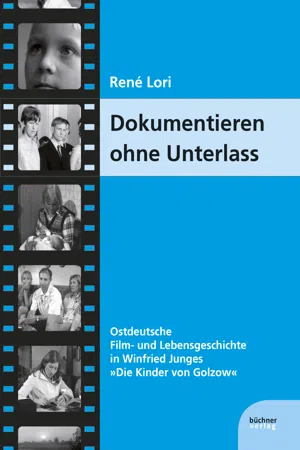
Dokumentieren ohne Unterlass
Ostdeutsche Film- und Lebensgeschichte in Winfried Junges "Die Kinder von Golzow"
- 152 pages
- English
- PDF
- Available on iOS & Android
Dokumentieren ohne Unterlass
Ostdeutsche Film- und Lebensgeschichte in Winfried Junges "Die Kinder von Golzow"
About this book
Kurz nach dem Mauerbau 1961 wird eine Gruppe von Kindern in einem kleinen Ort im Oderbruch eingeschult. Das Besondere: Ihr Leben wird von da an auf Zelluloid festgehalten. Als "Kinder von Golzow" erlangen sie über die Grenzen der DDR hinaus Berühmtheit. Inzwischen breiten über 20 Filme fast fünf Jahrzehnte Leben auf der Leinwand aus.René Lori beleuchtet anhand einer anschaulichen Filmauswahl, wie sich die gesellschaftlichen Veränderungsprozesse in den individuellen Biographien widerspiegeln. Der Blick reicht von der Abschottung der DDR über deren Verfall bis zum "Neuanfang" im vereinten Deutschland. Einen weiteren Schwerpunkt bilden die kulturpolitischen und dokumentarfilmischen Entwicklungen, die im Rahmen eines so kohärenten Projekts besonders augenscheinlich werden.Dabei erfolgt die Analyse dieser filmischen Langzeitbeobachtung in behutsamer Abwägung von sachlich Dokumentierbarem und politischer Einschätzung. Entstanden ist ein umfassender Überblick über ein auch im internationalen Maßstab einzigartiges Filmprojekt.René Lori, geboren 1980, studierte in Chemnitz und Marburg Medienwissenschaft, Informatik und Philosophie. Derzeit arbeitet er in der Online-Redaktion eines lokalen Fernsehsenders.
Frequently asked questions
- Essential is ideal for learners and professionals who enjoy exploring a wide range of subjects. Access the Essential Library with 800,000+ trusted titles and best-sellers across business, personal growth, and the humanities. Includes unlimited reading time and Standard Read Aloud voice.
- Complete: Perfect for advanced learners and researchers needing full, unrestricted access. Unlock 1.4M+ books across hundreds of subjects, including academic and specialized titles. The Complete Plan also includes advanced features like Premium Read Aloud and Research Assistant.
Please note we cannot support devices running on iOS 13 and Android 7 or earlier. Learn more about using the app.
Information
Table of contents
- Cover
- Inhalt
- 1 Einleitung
- 2 Dokumentarfilmtendenzen und Kulturpolitik seit Ende der fünfziger Jahre
- 3 Zur Entstehung des Golzow-Projekts
- 4 Phase I: Die Beobachtung der Schulzeit (1961–1971)
- 5 Phase II: Von der Gemeinschaftsbetrachtung zum Einzelportrait – Vorzeichen des gesellschaftlichen Wandels (1975–1984)
- 6 Phase III: Systemwechsel als neue Dimension – Auseinandersetzung mit der filmischen Vergangenheit – Programmtragende Einzelportraits (1991–2008)
- 7 Abschließende Bemerkungen
- 8 Literaturverzeichnis
- 9 Anhang